#transgender warriors
Text
As a rape survivor, I understand the need for safe space together – free from sexist harassment and potential violence. But fear of gender variance also can't be allowed to deceptively cloak itself as a women's safety issue. I can't think of a better example than my own, and my butch friends', first-hand experiences in public women's toilets. Of course women need to feel safe in a public restroom; that's a serious issue. So when a man walks in, women immediately examine the situation to see if the man looks flustered and embarrassed, or if he seems threatening; they draw on the skills they learned as young girls in this society to read body language for safety or danger.
Now, what happens when butches walk into the women's bathroom? Women nudge each other with elbows, or roll their eyes, and say mockingly, "Do you know which bathroom you're in?" Thats not how women behave when they really believe there's a man in the bathroom. This scenario is not about women's safety – its an example of gender-phobia.
And ask yourself, if you were in the women's bathroom, and there were two teenage drag queens putting on lipstick in front of the mirror, would you be in danger? If you called security or the cops, or forced those drag queens to use the men's room, would they be safe?
If the segregation of bathrooms is really about more than just genitals, then maybe the signs ought to read "Men" and "Sexually and Gender Oppressed," because we all need a safe place to go to the bathroom. Or even better, let's fight for clean individual bathrooms with signs on the doors that read "Restroom."
And defending the inclusion of transsexual sisters in women's space does not threaten the safety of any woman. The AIDS movement, for example, battled against the right-wing characterization of gay men as a "high-risk group." We won an understanding that there is no high-risk group – there are high-risk behaviors. Therefore, creating safety in women's space means we have to define unsafe behavior – like racist behavior by white women towards women of color, or dangerous insensitivity to disabilities.
Transsexual sisters are not a Trojan horse trying to infiltrate women's space. There have always been transsexual women helping to build the women's movement – they are part of virtually every large gathering of women. They want to be welcomed into women's space for the same reason every woman does – to feel safe.
Leslie Feinberg, Transgender Warriors: Making History from Joan of Arc to Marsha P. Johnson and Beyond
27K notes
·
View notes
Text
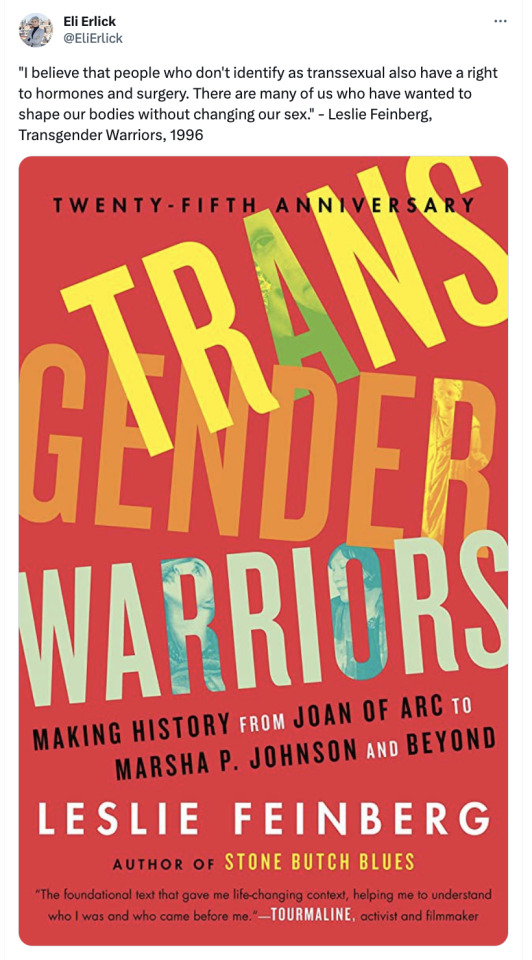
Way ahead of hir time. Hopefully, one day, everyone will have full autonomy over their bodies, making arguments restricting hormones a thing of the past. Get your copy here.
4K notes
·
View notes
Text
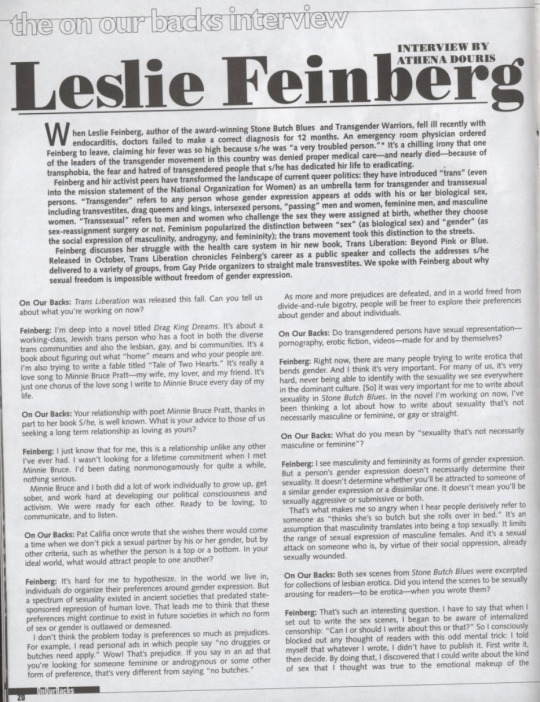
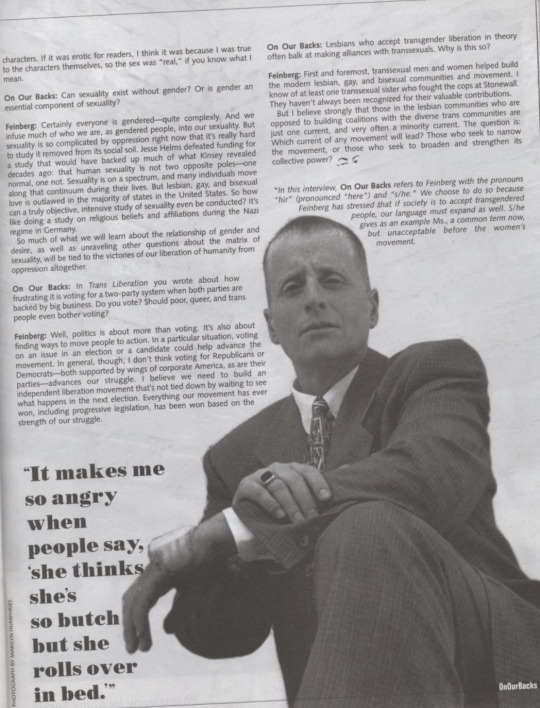
An interview with Leslie Feinberg appearing in the Oct/Nov 1998 issue of On Our Backs.
Please click on image to read or find the transcript below:
Feinberg and hir activist peers have transformed the landscape of current queer politics: they have introduced "trans" (even into the mission statement of the National Organization for Women) as an umbrella term for transgender and transsexual persons. "Transgender" refers to any person whose gender expression appears at odds with his or ber biological sex, including transvestites, drag queens and kings, intersexed persons, "passing" men and women, feminine men, and masculine women. "Transsexual" refers to men and women who challenge the sex they were assigned at birth, whether they choose sex-reassignment surgery or not. Feminism popularized the distinction between "sex" (as biological sex) and "gender" (as the social expression of masculinity, androgyny, and femininity); the trans movement took this distinction to the streets.
Feinberg and hir activist peers have transformed the landscape of current queer politics: they have introduced "trans" (even into the mission statement of the National Organization for Women) as an umbrella term for transgender and transsexual persons. "Transgender" refers to any person whose gender expression appears at odds with his or ber biological sex, including transvestites, drag queens and kings, intersexed persons, "passing" men and women, feminine men, and masculine women. "Transsexual" refers to men and women who challenge the sex they were assigned at birth, whether they choose sex-reassignment surgery or not. Feminism popularized the distinction between "sex" (as biological sex) and "gender" (as the social expression of masculinity, androgyny, and femininity); the trans movement took this distinction to the streets.
Feinberg discusses her struggle with the health care system in hir new book, Trans Liberation: Beyond Pink or Blue. Released in October, Trans Liberation chronicles Feinberg's career as a public speaker and collects the addresses s/he delivered to a variety of groups, from Gay Pride organizers to straight male transvestites. We spoke with Feinberg about why sexual freedom is impossible without freedom of gender expression.
On Our Backs: Trans Liberation was released this fall. Can you tell us about what you're working on now?
Feinberg: I'm deep into a novel titled Drag King Dreams. It's about a working-class, Jewish trans person who has a foot in both the diverse trans communities and also the lesbian, gay, and bi communities. It's a book about figuring out what "home" means and who your people are. I'm also trying to write a fable titled "Tale of Two Hearts." it's really a love song to Minnie Bruce Pratt-my wife, my lover, and my friend. It's just one chorus of the love song I write to Minnie Bruce every day of my life.
On Our Backs: Your relationship with poet Minnie Bruce Pratt, thanks in part to her book S/he, is well known. What is your advice to those of us seeking a long term relationship as loving as yours?
Feinberg: I just know that for me, this is a relationship unlike any other I've ever had. I wasn't looking for a lifetime commitment when I met Minnie Bruce. I°d been dating nonmonogamously for quite a while, nothing serious. Minnie Bruce and I both did a lot of work individually to grow up, get sober and work hard at developing our political consciousness and activism. We were ready for each other. Ready to be loving, to communicate, and to listen.
On Our Backs: Pat Califia once wrote that she wishes there would come a time when we don't pick a sexual partner by his or her gender, but by other criteria, such as whether the person is a top or a bottom. In your ideal world, what would attract people to one another?
Feinberg: It's hard for me to hypothesize. In the world we live in, individuals do organize their preferences around gender expression. But a spectrum of sexuality existed in ancient societies that predated state. sponsored repression of human love. That leads me to think that these preferences might continue to exist in future societies in which no form of sex or gender is outlawed or demeaned. I don't think the problem today is preferences so much as prejudices. For example, I read personal ads in which people say "no druggies or butches need apply." Wow! That's preiudice. If you say in an ad that you're looking for someone feminine or androgynous or some other form of preference. that's very different from saving "no butches." As more and more prejudices are defeated, and in a world freed from divide-and-rule bigotry, people will be freer to explore their preferences about gender and about individuals.
On Our Backs: Do transgendered persons have sexual representation-pornography, erotic fiction, videos made for and by themselves?
Feinberg: Right now, there are many people trying to write erotica that bends gender. And I think it's very important. For many of us, it's very hard, never being able to identify with the sexuality we see everywhere in the dominant culture. [So] it was very important for me to write about sexuality in Stone Butch Blues. In the novel I'm working on now, I've been thinking a lot about how to write about sexuality that's not necessarily masculine or feminine, or gay or straight.
On Our Backs: What do you mean by "sexuality that's not necessarily masculine or feminine"?
Feinberg: I see masculinity and femininity as forms of gender expression. But a person's gender expression doesn't necessarily determine their sexuality. It doesn't determine whether you'll be attracted to someone of a similar gender expression or a dissimilar one. It doesn't mean you'll be sexually aggressive or submissive or both. That's what makes me so angry when I hear people derisively refer to someone as "thinks she's so butch but she rolls over in bed." It's an assumption that masculinity translates into being a top sexually. It limits the range of sexual expression of masculine females. And it's a sexual attack on someone who is, by virtue of their social oppression, already sexually wounded.
On Our Backs: Both sex scenes from Stone Butch Blues were excerpted for collections of lesbian erotica. Did you intend the scenes to be sexually arousing for readers - to be erotica - when you wrote them?
Feinberg: That's such an interesting question. I have to say that when I set out to write the sex scenes, I began to be aware of internalized censorship: "Can I or should I write about this or that?" So I consciously blocked out any thought of readers with this odd mental trick: I told myself that whatever I wrote, I didn't have to publish it. First write it, then decide. By doing that, I discovered that I could write about the kind of sex that i thought was true to the emotional makeup of the characters. If it was erotic for readers, I think it was because I was true to the characters themselves, so the sex was "real," if you know what I mean.
On Our Backs: Can sexuality exist without gender? Or is gender an essential component of sexuality?
Feinberg: Certainly everyone is gendered - quite complexly. And we infuse much of who we are, as gendered people, into our sexuality. But sexuality is so complicated by oppression right now that it's really hard to study it removed from its social soil. Jesse Helms defeated funding for a study that would have backed up much of what Kinsey revealed decades ago: that human sexuality is not two opposite poles- one normal, one not. Sexuality is on a spectrum, and many individuals move along that continuum during their lives. But lesbian, gay, and bisexual love is outlawed in the majority of states in the United States. So how can a truly objective, intensive study of sexuality even be conducted? It's like doing a study on religious beliefs and affiliations during the Nazi regime in Germany. So much of what we will learn about the relationship of gender and desire, as well as unraveling other questions about the matrix of sexuality, will be tied to the victories of our liberation of humanity from oppression altogether.
On Our Backs: In Trans Liberation you wrote about how frustrating it is voting for a two-party system when both parties are backed by big business. Do you vote? Should poor, queer, and trans people even bother voting?
Feinberg: Well, politics is about more than voting. It's also about finding ways to move people to action. In a particular situation, voting on an issue in an election or a candidate could help advance the movement. In general, though, I don't think voting for Republicans or Democrats - both supported by wings of corporate America, as are their parties - advances our struggle. I believe we need to build an independent liberation movement that's not tied down by waiting to see what happens in the next election. Everything our movement has ever won, including progressive legislation, has been won based on the strength of our struggle.
On Our Backs: Lesbians who accept transgender liberation in theory often balk at making alliances with transsexuals. Why is this so?
Feinberg: First and foremost, transsexual men and women helped build the modern lesbian, gay, and bisexual communities and movement. I know of at least one transsexual sister who fought the cops at Stonewall. They haven't always been recognized for their valuable contributions. But I believe strongly that those in the lesbian communities who are opposed to building coalitions with the diverse trans communities are just one current, and very often a minority current. The question is: Which current of any movement will lead? Those who seek to narrow the movement, or those who seek to broaden and strengthen its collective power?
*In this interview, On Our Backs refers to Feinberg with the pronouns "hir" (pronounced "here") and "s/he." We choose to do so because Feinberg has stressed that if society is to accept transgendered people, our language must expand as well. S/he gives as an example Ms., a common term now, but unacceptable before the women's movement.
Source.
2K notes
·
View notes
Text

This Dykes to Watch Out for comic was made for Leslie Feinberg’s Transgender Warriors book in 1996.
Trans women and butches go way back. Don’t let anyone tell you otherwise
727 notes
·
View notes
Text

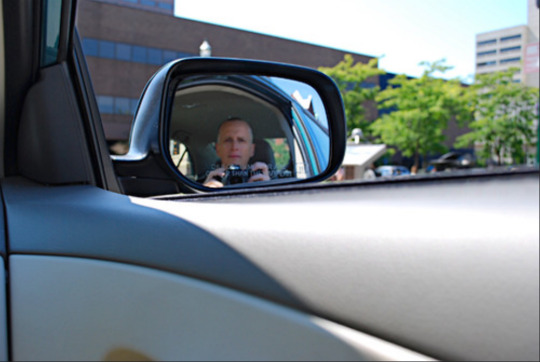
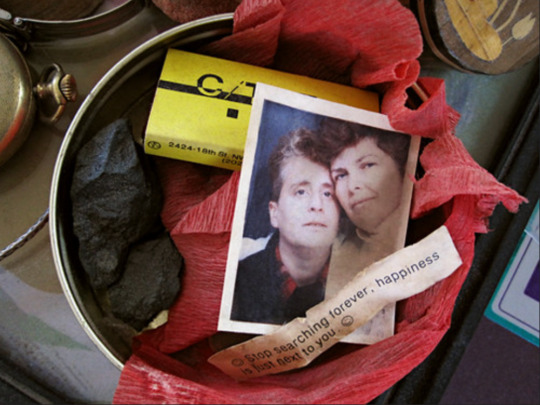
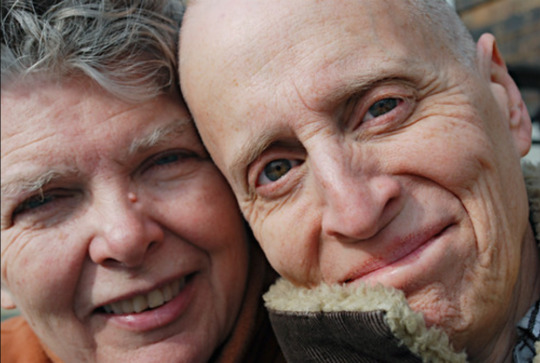
a collection of self portraits done by the revolutionary leslie feinberg. via flickr
#everyone should go through and look at all hir photos#that polaroid made me wanna cry#my post#lgbt#leslie feinberg#transgender warriors#sbb#stone butch blues#butch lesbian#ftm#transgender#trans#butch/femme#minnie bruce pratt
4K notes
·
View notes
Text
"And our female-to-male transsexual brothers have a right to feel welcome at women’s movement events or lesbian bars. However, that shouldn’t feed into the misconception that all female-to-male transexuals were butches who just couldn’t deal with their oppression as lesbians. If that were true, then why does a large percentage of post-transition transsexual men identify as gay and bisexual, which may have placed them in a heterosexual or bisexual status before their transition? There are transsexual men who did help build the women’s and lesbian communities, and still have a large base of friends there. They should enjoy the support of women on their journey. Doesn’t everyone want their friends around them at a time of great change? And women could learn a great deal about what it means to be a man or a woman from sharing the lessons of transition."
Transgender Warriors, Leslie Feinberg
#transgender warriors#i think if terminally online queers read this their brains would explode#'but men can never be in womens/lesbian spaces ever!!!!!' get fucked
224 notes
·
View notes
Text
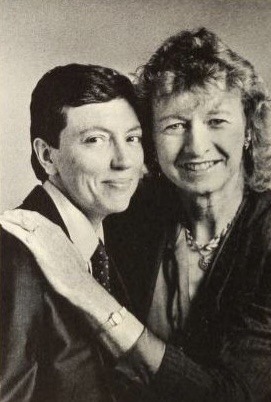
Dan/Linda, an FTM cross-dresser, with partner Yvonne, an MTF transgenderist. Love is a many gendered thing!
Black and white photograph of T4T couple, taken from the pages of Leslie Feinberg’s Transgender Warriors (1996)
2K notes
·
View notes
Text
Transgender Warriors by Leslie Feinberg

Transgender Warriors is an essential read for trans people of all ages who want to learn about the towering figures who have come before them—and for everyone who is part of the fight for trans liberation
This groundbreaking book—far ahead of its time when first published in 1996 and still galvanizing today—interweaves history, memoir, and gender studies to show that transgender people, far from being a modern phenomenon, have always existed and have exerted their influence throughout history. Leslie Feinberg—hirself a lifelong transgender revolutionary—reveals the origin of the check-one-box-only gender system and shows how zie found empowerment in the lives of transgender warriors around the world, from the Two Spirits of the Americas to the many genders of India, from the trans shamans of East Asia to the gender-bending Queen Nzinga of Angola, from Joan of Arc to Marsha P. Johnson and beyond.
#transgender warriors#leslie feinberg#transmasc#transfem#nonbinary#trans book of the day#trans books#queer books#bookblr#booklr
35 notes
·
View notes
Text
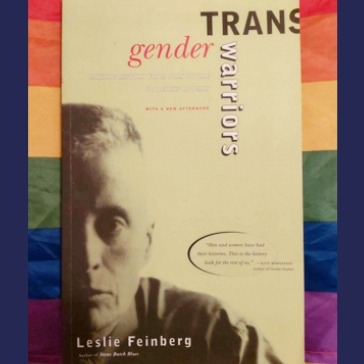
Y llyfr heddiw yw 'Transgender Warriors' gan Leslie Feinberg, a gyhoeddwyd yn 1996.
Roedd y llyfr hwn yn arloesol yn ei amser ar gyfer ei gasgliad o hanes traws. Bu farw Leslie Feinberg yn 2014, ond mae effaith o ei ngwaith sîe* yn enfawr. Mae Feinberg yn ysgrifennu ar y Helyntion Beca ac enghreifftiau eraill groeswisgo mewn hanes (tudalen 75). Mae sî'n arloeswr mewn hanes trawsryweddol yn fy marn i!
Ydych chi wedi darllen y llyfr hwn?
/
Today's book is 'Transgender Warriors' by Leslie Feinberg, published in 1996.
This book was groundbreaking in its time for its collection of trans history. Leslie Feinberg died in 2014, but the impact of hir work is huge. Feinberg writes on the Rebecca Riots and other examples of cross-dressing in history (page 75). Zie is a pioneer of transgender history in my opinion!
Have you read this book?
[*Nodyn: Defnyddiodd Feinberg ragenwau zie/hir. Ysgrifennais y rhagenwau hyn fel 'sîe' yn y testun uchod, gyda 'sî'n' fel 'sîe' + yn. Mae 'hî'n' yn gweithio hefyd, ond mae'n edrych ac yn swnio fel y rhagenw benywaidd hi'n, felly defnyddiais 'sî'n'. Gweler hefyd: rhagenwau Cymraeg newydd 'sîe/sîr' yn fy erthygl yma: Rhagenwau Rhyfedd
/
Note: Feinberg used zie/hir pronouns. I wrote these pronouns as 'sîe' in the text above, with 'sî'n' as 'sîe' + yn. 'Hî'n' works as well, but it looks and sounds like the female pronoun hi'n, so I used 'sî'n'. See also: Welsh neopronouns 'sîe/sîr' in my article here: Rhagenwau Rhyfedd**]
#cymraeg#welsh#lhdt#trawsryweddol#anneuaidd#cymblr#llyfr#transgender history#Leslie Feinberg#Feinburg#Transgender Warriors#trans history#transgender rights#** note - the title of the article has a typo in it which needs editing - I will contact the owners of the site to fix this when they can#Llyfrau Mawrth
14 notes
·
View notes
Text
Leslie Feinberg's Transgender Warriors has a fascinating take on male/female identities. The god Dionysus is described as "A man-woman-- a double-being, doubly powerful" (page 62) and I like that a lot. Might use it for my own gender.
#transgender warriors#btw this is a multigender blog second and a leslie feinberg stan account first#<- relevant again#leslie feinberg
53 notes
·
View notes
Text
I finally finished Stone Butch Blues, wow, I'm probably gonna have to re-read it soon to fully process it, and at some point I want to re-read Transgender Warriors... But for now I gotta read Gender Euphoria.... I uhh love queer/trans books so much
#trans#transgender#queer#Leslie Feinberg#stone butch blues#leslie feinberg stone butch blues#transgender warriors#gender euphoria#trans books#queer books#trans literature#queer literature#Aqueertalksqueerly
40 notes
·
View notes
Text
"Women" are a social construct. So are "Men". It's not just "gender" as a concept that's a social construct, the idea of "men" and "women" are also just as constructed.
#this is why my flatland short story reommends ALSO reading Leslie Feinberg's Transgender Warriors#gender#feminism#transfeminism#Flatland#YES IT'S RELEVANT#Transgender Warriors#Leslie Feinberg#anyways. read Leslie Leinberg's Transgender Warriors#and then read flatland#or vice versa
10 notes
·
View notes
Text
Transgender Warriors : Making History from Joan of Arc to Dennis Rodman by Leslie Feinberg
goodreads

In this fascinating, personal journey through history, Leslie Feinberg uncovers persuasive evidence that there have always been people who crossed the cultural boundaries of gender. Transgender Warriors is an eye-opening jaunt through the history of gender expression and a powerful testament to the rebellious spirit.
Mod opinion: I've read it and I really, really, really love this book.
#transgender warriors#leslie feinberg#polls#trans lit#trans literature#trans books#lgbt lit#lgbt literature#lgbt books#own voices#nonfiction#history
2 notes
·
View notes
Text

Transgender Warriors: Making History from Joan of Arc to Dennis Rodman by Leslie Feinberg
#my bisexuality deffo impacts my personal view of bigenderism in that my bisexuality is my gender thus for me both the inbetween & abscence#are coexistent with both of the polarities described above. to put it in very concise terms. but irregardless this is still super#interesting & it made me very happy to see it. people like me have always been here!#bigender#all things gender#trans tag#bigender history#transgender history#trans history#lgbt+ history#transgender warriors#currently reading#2023 reads#excerpts#leslie feinberg
9 notes
·
View notes
Text
some day i will illustrate joan of arc as a young transmasc burning in the fire of the far-right witch hunt, today is not that day but still know that i am him, they are me, we are one.
4 notes
·
View notes
Text
We can never throw enough people overboard to win approval from our enemies. Should we try to argue that we're as "normal" as those who organize against our civil rights? Forget it! I am queer and proud of it.
Transgender Warriors, Leslie Feinberg
#quite possibly my favorite line in this entire book which is saying something#incredible book. i cannot recommend it highly enough#transgender warriors#queer history#leslie feinberg
323 notes
·
View notes